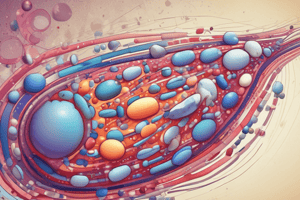Podcast
Questions and Answers
Which of the following are antigout drugs?
Which of the following are antigout drugs?
- Colchicine (correct)
- Allopurinol (correct)
- Ibuprofen
- Febuxostat (correct)
What is COX 1 involved in?
What is COX 1 involved in?
Housekeeping activities including gastric mucosal protection, platelet aggregation, and maintenance of renal function.
What is COX 2 known for?
What is COX 2 known for?
Causing pain and inflammation.
What accurately describes inflammation?
What accurately describes inflammation?
What are the cardinal signs of inflammation?
What are the cardinal signs of inflammation?
Match the following NSAIDs to their chemical classes:
Match the following NSAIDs to their chemical classes:
What occurs in the body of patients with gout when crystals deposit?
What occurs in the body of patients with gout when crystals deposit?
What causes gout?
What causes gout?
What is hyperuricemia?
What is hyperuricemia?
Which NSAID is an irreversible cyclooxygenase inhibitor?
Which NSAID is an irreversible cyclooxygenase inhibitor?
What conditions may be treated with ibuprofen?
What conditions may be treated with ibuprofen?
What is the duration of action of ibuprofen?
What is the duration of action of ibuprofen?
What is the pharmacokinetics of probenecid?
What is the pharmacokinetics of probenecid?
Which antigout therapies inhibit xanthine oxidase?
Which antigout therapies inhibit xanthine oxidase?
How is lesinurad excreted?
How is lesinurad excreted?
Which patient cannot safely receive therapy with naproxen?
Which patient cannot safely receive therapy with naproxen?
What is a concern with the initiation of meloxicam in a patient taking lisinopril?
What is a concern with the initiation of meloxicam in a patient taking lisinopril?
Which laboratory results should a nurse assess before initiating ibuprofen for an extended period?
Which laboratory results should a nurse assess before initiating ibuprofen for an extended period?
What is a concern for a patient receiving ibuprofen with alendronate?
What is a concern for a patient receiving ibuprofen with alendronate?
Which antigout drugs are associated with an increased risk for stroke and myocardial infarction?
Which antigout drugs are associated with an increased risk for stroke and myocardial infarction?
Why would a nurse call the health care provider before administering lesinurad?
Why would a nurse call the health care provider before administering lesinurad?
Which parameters should be assessed before administering allopurinol?
Which parameters should be assessed before administering allopurinol?
Which patients cannot safely receive therapy with probenecid?
Which patients cannot safely receive therapy with probenecid?
Which antigout drug may have contributed to a patient's fever, rash, eosinophilia, kidney failure, and pancytopenia?
Which antigout drug may have contributed to a patient's fever, rash, eosinophilia, kidney failure, and pancytopenia?
What are the expected results when arachidonic acid is metabolized through the prostaglandin pathway?
What are the expected results when arachidonic acid is metabolized through the prostaglandin pathway?
Flashcards are hidden until you start studying
Study Notes
Antigout Drugs
- Includes Allopurinol, Febuxostat, Colchicine, Probenecid, and Lesinurad.
COX Enzymes
- COX 1: Protects gastric mucosa, aids platelet aggregation, and maintains renal function.
- COX 2: Associated with pain and inflammation, generally has fewer side effects compared to COX 1.
Inflammation
- Arachidonic acid is released after tissue injury, leading to inflammation.
Cardinal Signs of Inflammation
- Edema, erythema, heat, and pain are primary manifestations.
NSAID Classifications
- Aspirin: Salicylate
- Diclofenac Sodium: Acetic acid derivative
- Piroxicam: Enolic acid derivative
- Naproxen: Propionic acid derivative
Gout Pathophysiology
- Crystal deposition may cause inflammatory symptoms.
- Gout can arise from excessive uric acid production, reduced excretion, or both.
- Hyperuricemia signifies elevated uric acid levels in blood, potentially leading to crystal formation.
- Uric acid originates from purine metabolism: purines → hypoxanthine → xanthine → uric acid.
NSAID Characteristics
- Aspirin: Irreversible COX inhibitor.
- Ibuprofen: Treats conditions such as patent ductus arteriosus, dysmenorrhea, fever, inflammation, and pain. Duration of action is 4-6 hours.
Pharmacokinetics
- Probenecid undergoes glucuronide conjugation and oxidation.
- Lesinurad is excreted via urine and feces.
Gout Therapies
- Allopurinol and Febuxostat act by inhibiting xanthine oxidase.
Medication Interactions and Concerns
- Naproxen cannot be safely administered to patients undergoing dialysis.
- Concurrent use of lisinopril and meloxicam may diminish antihypertensive effects, raising blood pressure.
- Monitor platelet count, renal function, liver function tests, and hemoglobin/hematocrit before starting ibuprofen.
- Increased gastrointestinal bleeding risk when ibuprofen is given with alendronate.
Stroke and Myocardial Infarction Risk
- Febuxostat and Lesinurad are linked to a heightened risk of stroke and myocardial infarction.
Administration Guidelines
- Lesinurad should be combined with Allopurinol or Febuxostat; otherwise, consulting a healthcare provider is necessary.
- Assess uric acid levels, kidney function, complete blood count, and medication list before beginning Allopurinol.
- Probenecid is contraindicated in patients on dialysis or requiring liver transplants.
Adverse Effects of Antigout Medications
- Allopurinol use may lead to fever, rash, eosinophilia, kidney failure, and pancytopenia.
Arachidonic Acid Metabolism
- Metabolism through the prostaglandin pathway results in edema, pain, and increased vasopermeability.
Studying That Suits You
Use AI to generate personalized quizzes and flashcards to suit your learning preferences.




